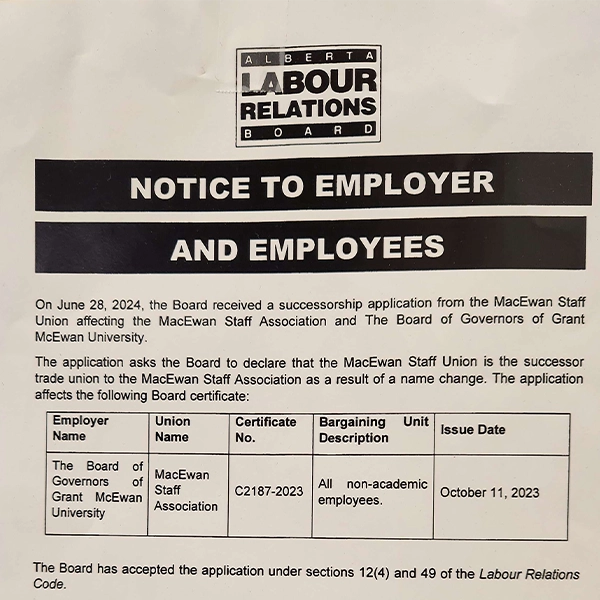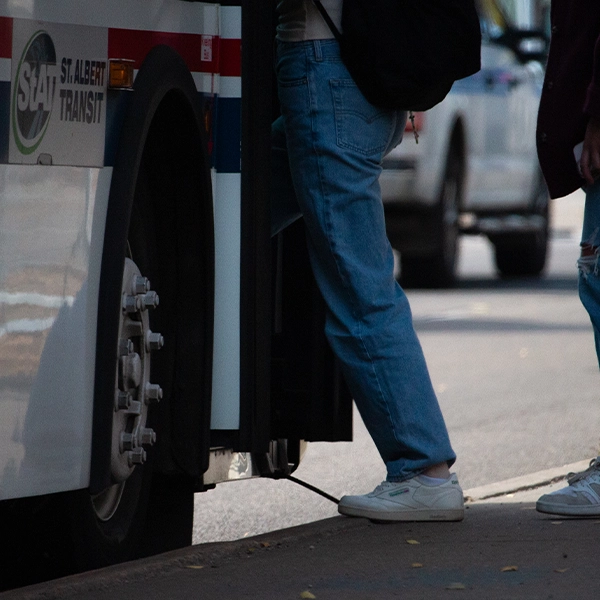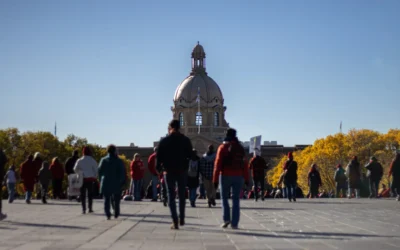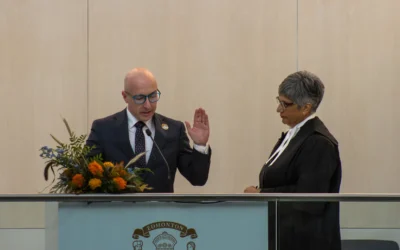Originally published on November 1, 2024
MacEwan staff’s official bargaining agent restructures under new name
Ben Haney
The MacEwan Staff Union, which represents non-academic employees at the university, has been acknowledged by the Alberta Labour Relations Board as the successor organization to the MacEwan Staff Association.

The change in status was approved by members at the annual general meeting in May 2024. The MacEwan Staff Union, or MSU, applied for their successorship application in June.
Before the vote, the MacEwan Staff Association operated as both an association and a society under the Alberta Societies Act. Following the vote, the MSU will operate solely as a wall-to-wall trade union.
Sarah Alexander, the MSU’s president, said the change was made in order to reduce legislative redundancy for the union.
Harry Oosterhoff, MSU’s executive director, said the change in status makes it easier for staff to do their jobs more efficiently. He also said, “It’s not that rare of a status . . . the University of Alberta’s Staff Union operates in the same way.”
Oosterhoff said that the dual status is a hold-over from the union’s founding when, in the 1980s, the union was only voluntarily recognized by MacEwan.
While the change allows for less administrative red tape, the MSU still operates under the guidelines of the CRA for unions and not-for-profit organizations.
Delay and denial of loans affecting MacEwan students
Carlissa Neumann and Duc Khuong Nguyen
Students across Alberta are being affected by delays for provincial and federal student loans due to an “all-time record high number of applications,” according to Alberta Advanced Education.
Students who applied for loans back in July of 2024 are still waiting for funds well into the semester. Some have waited for months only to be denied the funding which they rely on for living expenses, textbooks, and vital school supplies.
According to the Alberta Student Aid website, “processing times may exceed 45 days.” Though many students do not have this time to wait, struggling to get by in the meantime.
Third-year journalism student Kaitlin Marie says she’s frustrated with Alberta Student Aid, “My student loan decision was delayed right up until the add/drop deadline, I was denied due to dropping down to part-time in 2023,” Marie says. “[I am] unable to apply for loans again until April 2025.”
The frustration of having to wait so long only to be denied has left her questioning the Alberta Student Aid system.
“Not everyone can attend full-time studies, not everyone comes from families who pay for their education, things happen in people’s lives that make a person have to drop classes, or not progress their year of study faster than two semesters.”
She adds,“ And the thing is, student loans are a loan that has interest, we all have to pay it back,” explaining that a policy change has left her with “a tuition bill [she] can’t afford [herself]. “I’m a low-income student who can barely afford food and I’m supposed to come up with $3,000 in the next week.”
Though Marie’s experience with student aid is challenging, Alberta Advanced Education insists that the number of students affected is very low. In a statement to the Griff, a spokesperson for Alberta Advanced Education said, “Currently, approximately three per cent of applications are exceeding our 45-day service standard for processing.”
Alberta Advanced Education also emphasized that the province is doing everything in its power to process the delayed applications, “Additional internal department resources are being allocated to address the application backlog, and we expect to meet our service standard for applications from students at Alberta public post-secondary institutions by the end of September.”
In the meantime, students like Marie are eagerly awaiting their funding.
MacEwan transit users, are there fare gates in your future?
Zoey McRae
On Sept. 17, the urban planning committee of the Edmonton City Council revisited a proposal put forth in December of last year for a fare gate pilot program. The program would include a two-year trial of fare gates at two Edmonton transit stations.
If the pilot plan gets approved and the City Council gets funding, fare gates will be implemented as a test run at the Churchill and Belvedere LRT stations.
The big question for those of us who take transit regularly is whether fare gates are even worth it.
Jenna Hankinson, a student at MacEwan, believes that they are.
“People who are riding the train for free or just kind of loitering around there, they wouldn’t be able to get in […] And so people who are only wanting to ride the trains could get in,” Hankinson says. She adds that this type of program would make using the Edmonton Transit System safer.
MacEwan student Faizan Sohail agrees that fare gates would make using transit a safer experience, but they would be an inconvenience for riders. Sohail says that, in his experience, fare gates do not help with large crowds and would end up creating more of a line. Despite this, Sohail says that over time, he believes fare gates would make a difference in the number of people who actually pay for the service.
On the other hand, MacEwan student Sophie (who declined to give her last name) says that while fare gates might make the transit system safer for riders, it will only help if they are included at all transit stations.
“I think putting gates on only two [stations] is dooming the test to failure,” Sophie says, “. . . but I think implementing transit gates on all stations would be a good idea.”
Currently, the city’s plans for fare gates at transit stations are still up in the air, but it is probably best to get used to scanning your Arc card each time you use the train, just in case.
Students’ council meeting: Oct. 16, 2024
Liam Newbigging
At the Oct. 16 meeting of the Students’ Association of MacEwan University (SAMU) students’ council, councillors weighed in on potential changes for how often councillors should get paid, executives gave updates on advocacy with the city and MacEwan, and the council named the 2023/2024 councillor of the year.
Councillor Delaney Huhtala, who is concluding their one and only term on council, received the award.
Notes from the Executive Committee (EC)
Vice-president (governance and finance) Joseph La Torre reported on the third tuition consultation meeting, where SAMU asked to follow up on MacEwan’s proposal for fees.
President Gabriel Ambutong reported on a meeting between the Edmonton Student Alliance (of which SAMU is a member), the mayor’s office, city councillors and city administration, and a separate meeting between SAMU’s first EC and MacEwan’s executive leadership.

Questions from council
Councillor Sonia Yusuf asked for clarification on what EC spoke about in its meeting with MacEwan. Ambutong said conversations revolved around the students’ concerns informed by the spring survey.
Yusuf also asked vice-president (academic) Darcy Hoogers about how SAMU is getting the word out about a sit-in protest at the general faculties council meeting on Oct. 28, which SAMU is organizing.
Hoogers said SAMU’s marketing team and promo squad are on the job, with marketing materials coming up around the school and online.
“We hope to have realistically as many students as the room can fill,” Hoogers said.
Potential changes to councillors’ pay
In the consultation period, La Torre prompted council members to speak up about whether or not the students’ council should move to one of two new payment schedules for councillors’ pay or stay with the current once-per-year payment.
Some councillors, including Layal Zidan, spoke in favour of the option for a quarterly payment to help with financial stress for councillors and incentivize people to take on the job.
Speaking against any changes, Councillor Joehn Torres and others argued that any changes could compromise the spirit of the position. “We didn’t run for the monetary value,” Torres said.
As a balance between the two, Councillor Inder Singh responded that biannual payments may be the best option.
No official motion to change payment schedules has been proposed.
SAMU annual report
A motion was passed to approve the 2023/2024 SAMU annual report, which provides updates on important benchmarks for SAMU services, advocacy, and financial statements for the institution.
High turnout for students’ council election marks changing tide
Liam Newbigging
Editor’s note: Data provided to the Griff on SAMU students’ council elections only extends back to 2008, with percentages only going as far as 2011.
On Oct. 16 and 17, SAMU had one of its most engaged students’ council elections on record. The results are now in, and the members of the 2024/2025 Students’ Council are:
Sonia Yusuf, Nathan Poon, Izzy Reyes, Aidan Fisher, Cierra Jacobs, Cornelius Glasgow, Tolu Dare, Layal Zidan, Joehn Torres, Aryan Dutta, Moselle Namoc, Chioma Uzor, Vincent Trinh, Maade Okai.
Topping the charts this year were returning councillors Sonia Yusuf and Nathan Poon, with Yusuf netting more votes than any candidate in this year’s election.
Newcomers to the council, Izzy Reyes and Aidan Fisher, weren’t far behind the two veterans, each bagging 650 votes or more.
With 22 people running, this election had the most candidates out of any students’ council election on record and the second-highest voter participation, with 13.2 per cent of students (2,153 voters) showing up to vote. This is the most since 13.62 per cent of students cast their ballots in 2011.
This shift marks a turning point in student governance at MacEwan after elections post-COVID-19 struggled to attract enough candidates to fill seats and saw historically low turnouts.
The new council will take office on Nov. 1 and will have its first meeting on Nov. 20.
SAMU will no longer fill the vacancy for vice-president (external)
Liam Newbigging
At a special Oct. 2 meeting, the Students’ Association of MacEwan University’s (SAMU) students’ council decided, based on reasons discussed confidentially, to no longer pursue filling the role of vice-president (external) for the remainder of the current elected term.
The students’ association has been seeking to fill the role since Aug. 31, and while SAMU bylaw 71 states that the council may appoint a qualified member to take on the role, it also may “divide responsibilities of the position.”
In an email to the Griff, SAMU president Gabriel Ambutong said, “Council has decided to task EC [executive committee] with distributing the roles and responsibilities of the VPE among current EC members.”
Before the former VPE Alric Reid’s departure priorities, policy asks, and strategies for the role had already been decided, and business will continue as usual.
“The impact on SAMU’s external advocacy will be minimal,” Ambutong says.
Ambutong adds he will be taking on most of the role’s responsibilities but that other members of EC may pick up the slack if need be.
Elections for next year’s executive committee will be held in March, with members taking office May 1, 2025.





0 Comments